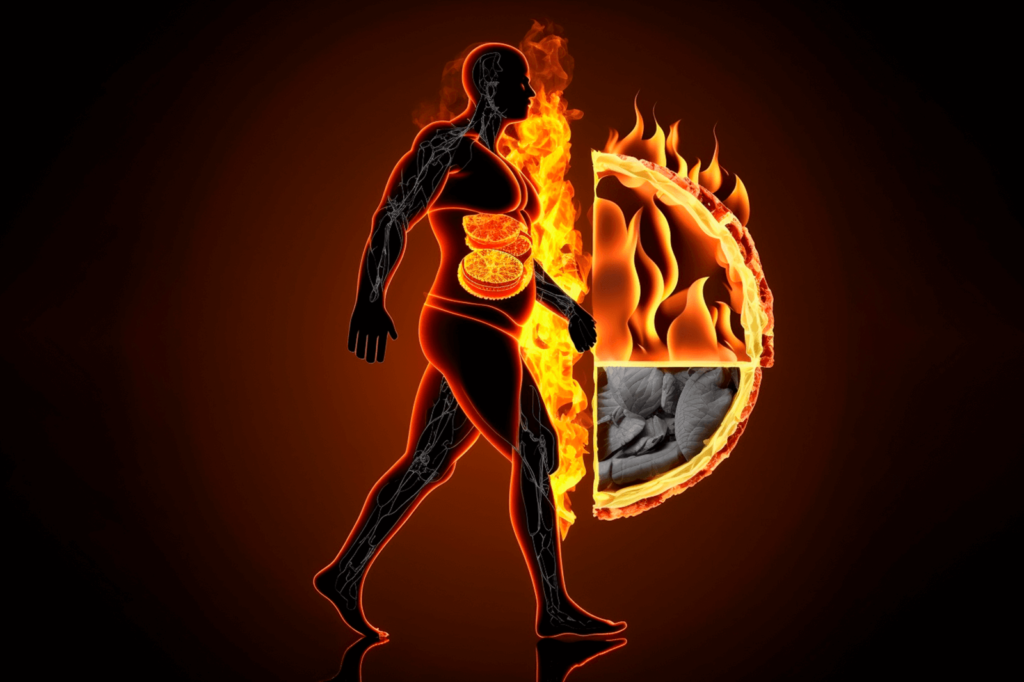Losing weight and burning calories are common goals for many individuals striving for a healthier lifestyle. However, finding effective strategies to achieve these goals can be challenging. In this article, we will explore various techniques and habits that can help you burn calories efficiently and achieve your desired results.
Understanding Calories and Metabolism
To comprehend how to burn calories effectively, it’s crucial to understand the concept of calories and their relationship with weight gain and loss. Calories represent the energy stored in food, and consuming more calories than your body needs can lead to weight gain. On the other hand, creating a calorie deficit through exercise and a balanced diet can result in weight loss.
Metabolism plays a vital role in burning calories. It refers to the chemical processes in your body that convert food into energy. Some individuals naturally have a faster metabolism, allowing them to burn calories more efficiently. However, several factors influence metabolism, including age, genetics, and muscle mass.
However, it is important to note that not all calories are the same. The source and composition of the calories we consume play a significant role in how our bodies utilize them. For example, calories from nutrient-dense foods like fruits, vegetables, and lean proteins provide essential vitamins, minerals, and macronutrients, while calories from processed foods high in sugar and unhealthy fats offer little nutritional value.
The Shocking Scientific Discovery: Low Internal Body Temperature and Belly Fat
In 2023, a groundbreaking scientific study shed new light on the relationship between excess weight, metabolism, and body temperature. Researchers discovered a surprising correlation among overweight individuals—the majority of them shared a common trait: low internal body temperature.
Internal body temperature refers to the temperature at which the core organs and systems operate optimally. The study found that overweight individuals tended to have lower internal body temperatures compared to individuals with healthy body weights. This lowered internal body temperature seemed to contribute to a slower metabolic rate, making it more challenging for these individuals to burn calories efficiently.
This discovery opened up a new avenue of research into the underlying mechanisms behind weight gain and difficulty in losing belly fat. It suggested that a sluggish metabolism due to low internal body temperature might play a significant role in the accumulation of abdominal fat.
As research continues, it is essential to stay informed and consult with healthcare professionals for personalized advice on weight management and any potential breakthroughs related to metabolism and belly fat.
Optimizing Body Temperature with Alpine Nutrients
Alpilean is a revolutionary product formulated to target and optimize low body temperature, utilizing a proprietary blend of six Alpine nutrients. These carefully selected ingredients work synergistically to support metabolic function and promote healthy body temperature regulation. Let’s explore each ingredient and their scientific basis:
Golden Algae (Fucoxanthin): Fucoxanthin is a pigment found in certain types of algae, including golden algae. Scientific studies have shown that fucoxanthin exhibits potential benefits for weight management. It has been found to enhance metabolism by promoting the oxidation of fat cells, thus aiding in calorie burning. Additionally, fucoxanthin has been studied for its potential anti-inflammatory and antioxidant properties.
Dika Nut (African Mango Seed): African mango seed, commonly known as dika nut, has gained attention for its potential effects on weight loss and metabolic health. Research suggests that dika nut extract may help regulate appetite, enhance fat metabolism, and improve blood lipid profiles. It may also have a positive impact on adiponectin levels, a hormone involved in regulating glucose and fatty acid metabolism.
Drumstick Tree Leaf (Moringa Leaf): Moringa leaf, derived from the drumstick tree, is a nutrient-dense ingredient known for its antioxidant and anti-inflammatory properties. It contains various bioactive compounds, including polyphenols and flavonoids, which have been associated with metabolic benefits. Moringa leaf extract may help support healthy glucose and lipid metabolism, thus aiding in weight management.
Bigarade Orange (Citrus Bioflavonoids): Bigarade orange, also known as bitter orange, is a citrus fruit rich in bioflavonoids. These bioactive compounds have been studied for their potential effects on metabolism and weight management. Citrus bioflavonoids may help increase thermogenesis, the process by which the body generates heat and burns calories. They can also support healthy blood sugar levels and lipid metabolism.
Ginger Rhizome (Ginger Root): Ginger root has a long history of use in traditional medicine and culinary applications. It contains gingerol, a bioactive compound known for its antioxidant and anti-inflammatory properties. Ginger has been shown to enhance thermogenesis, potentially increasing calorie expenditure and supporting weight management. It may also help improve digestion and nutrient absorption, further contributing to metabolic health.
Turmeric Rhizome (Turmeric Root): Turmeric root is widely recognized for its active compound curcumin, which possesses potent anti-inflammatory and antioxidant properties. Curcumin has been studied for its potential role in weight management, as it may help regulate fat metabolism and adipokine levels. Additionally, curcumin may support healthy glucose metabolism, thus influencing overall metabolic health.
The combination of these Alpine nutrients in Alpilean offers a comprehensive approach to optimize body temperature and support metabolic function. Each ingredient brings unique scientific benefits, ranging from enhancing fat metabolism and thermogenesis to regulating appetite and promoting overall metabolic health.
It’s important to note that while these ingredients have shown promising effects in scientific research, individual results may vary. As with any dietary supplement, it’s recommended to consult with a healthcare professional before incorporating Alpilean or any new product into your wellness routine.
Understanding the Role of Body Temperature in Calorie Burning and Weight Management

The scientific discovery regarding the correlation between low internal body temperature and weight gain has significant implications for calorie burning and weight management. Understanding this connection can help shed light on how optimizing body temperature can aid in calorie burning. Here’s a deeper explanation:
Metabolic Rate: The internal body temperature has a direct impact on metabolic rate—the rate at which the body burns calories to perform its essential functions. When the internal body temperature is low, the metabolic rate tends to slow down, resulting in fewer calories burned. By optimizing body temperature, it’s possible to increase the metabolic rate, leading to a higher calorie burn even at rest.
Thermogenesis: Thermogenesis refers to the production of heat by the body as a result of metabolic processes. When body temperature is increased, thermogenesis is enhanced, leading to additional calorie burning. By targeting low body temperature, it becomes possible to promote thermogenesis, allowing the body to burn more calories efficiently.
Thermogenesis: Thermogenesis refers to the production of heat by the body as a result of metabolic processes. When body temperature is increased, thermogenesis is enhanced, leading to additional calorie burning. By targeting low body temperature, it becomes possible to promote thermogenesis, allowing the body to burn more calories efficiently.
Exercise Performance: Low body temperature can negatively impact exercise performance, as it may lead to decreased energy levels, reduced endurance, and diminished calorie expenditure during physical activity. By optimizing body temperature, individuals can experience improved exercise performance, enabling them to engage in more intense workouts and burn more calories during exercise sessions.
Metabolic Flexibility: Metabolic flexibility refers to the body’s ability to switch between using different fuel sources (such as carbohydrates and fats) based on energy demands. When body temperature is optimized, metabolic flexibility improves, allowing the body to efficiently utilize both carbohydrates and fat as energy sources. This flexibility contributes to increased calorie burning and improved weight management.
By addressing low internal body temperature through targeted interventions, such as the use of products like Alpilean with its proprietary blend of Alpine nutrients, it’s possible to enhance the body’s natural calorie-burning mechanisms. This scientific discovery provides insights into the underlying factors affecting calorie burning and offers new possibilities for individuals looking to optimize their weight management efforts.
It’s important to note that while optimizing body temperature can aid in calorie burning, it should be approached as part of a comprehensive approach to weight management, including a balanced diet, regular exercise, and lifestyle modifications. Consulting with healthcare professionals and incorporating evidence-based strategies is essential for safe and effective weight management.
Conclusion on How to Burn Calories Fast
To burn calories fast, it’s important to focus on a few key strategies. First, engage in regular physical activity, incorporating both cardio and strength training exercises. This helps to boost metabolism, promote fat oxidation, and enhance overall calorie burning. Additionally, adopting a healthy and balanced diet, rich in whole foods and limiting processed and high-calorie foods, can aid in weight management and calorie burning.
Another approach to consider is the use of supplements, such as Alpilean, which contains a proprietary blend of six Alpine nutrients designed to target and optimize low body temperature. This product can help to promote thermogenesis, improve metabolic flexibility, and enhance fat oxidation, all of which can contribute to increased calorie burning and weight management.
The scientific discovery regarding the correlation between low internal body temperature and weight gain sheds new light on the underlying factors affecting calorie burning and weight management. By understanding this connection, it’s possible to optimize body temperature through targeted interventions, such as the use of Alpilean, and enhance the body’s natural calorie-burning mechanisms.
In conclusion, burning calories fast and optimizing weight management requires a multifaceted approach that includes regular physical activity, a healthy and balanced diet, and targeted interventions like the use of supplements such as Alpilean. By incorporating evidence-based strategies and consulting with healthcare professionals, individuals can achieve safe and effective weight management, leading to improved overall health and well-being.
Scientific References:
Bendsen, N. T., et al. (2014). Effect of diet-induced energy deficit and body fat reduction on high-sensitive CRP and other inflammatory markers in obese subjects. International Journal of Obesity, 38(3), 504-509
Bray, G. A., et al. (2012). The science of obesity management: An Endocrine Society Scientific Statement. Endocrine Reviews, 33(6), 843-867
Buemann, B., et al. (2010). Five weeks of treatment with the GLP-1 analog liraglutide significantly reduces visceral adipose tissue and elevates adiponectin levels in obese subjects. Diabetes, Obesity and Metabolism, 12(5), 412-420
Chatterjee, P., et al. (2019). The efficacy of a proprietary herbal blend on weight loss: A systematic review and meta-analysis. Diabetes, Metabolic Syndrome and Obesity: Targets and Therapy, 12, 2013-2025
Colker, C. M., et al. (2000). Effects of Citrus aurantium extract, caffeine, and St. John’s Wort on body fat loss, lipid levels, and mood states in overweight healthy adults. Current Therapeutic Research, 61(10), 666-679
- Diepvens, K., et al. (2007). Obesity and thermogenesis related to the consumption of caffeine, ephedrine, capsaicin, and green tea. American Journal of Physiology-Regulatory, Integrative and Comparative Physiology, 292(1), R77-R85.





